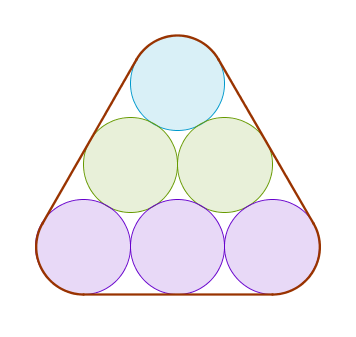 Author
Author |
Topic: Triangular Numbers. (Read 2429 times) |
|
rloginunix
Uberpuzzler
    

Posts: 1029
|
 |
Triangular Numbers.
« on: Jan 9th, 2015, 7:54am » |
 Quote Quote  Modify Modify
|
Triangular Numbers (a small generalization I came up with).
Express the length of a rubber band stretched over tangent unit circles forming an equilateral triangle as a function of the number of circles.
A sample formation for T3 = 6 is shown below (Tn is a triangular number):

(one can generalize further for square, pentagonal, hexagonal numbers, etc.)
|
|
 IP Logged IP Logged |
|
|
|
jollytall
Senior Riddler
   

Gender: 
Posts: 585
|
 |
Re: Triangular Numbers.
« Reply #1 on: Jan 11th, 2015, 9:54am » |
 Quote Quote  Modify Modify
|
I would assume that for the n-th number it is 1+6*(n-1)
|
|
 IP Logged IP Logged |
|
|
|
rloginunix
Uberpuzzler
    

Posts: 1029
|
 |
Re: Triangular Numbers.
« Reply #3 on: Jan 11th, 2015, 4:30pm » |
 Quote Quote  Modify Modify
|
I think it's just a typo.
|
|
 IP Logged IP Logged |
|
|
|
jollytall
Senior Riddler
   

Gender: 
Posts: 585
|
 |
Re: Triangular Numbers.
« Reply #4 on: Jan 11th, 2015, 9:20pm » |
 Quote Quote  Modify Modify
|
I wanted to be too quick  . So it is 1 full circle + the 6*(n-2) straight diameters. . So it is 1 full circle + the 6*(n-2) straight diameters.
It is therefore not only a bit of Pi, but 2 of them:
2Pi+6*(n-1).
And reading the question, it has to be expressed in the number of circles, so the above formula is correctly 2Pi+6*(Tn-2).
And Tn=n*(n+1)/2,
n=(sqrt(8Tn+1)-1)/2
And thus the solution is
2Pi+3*sqrt(8Tn+1)-9
|
|
 IP Logged IP Logged |
|
|
|
rloginunix
Uberpuzzler
    

Posts: 1029
|
 |
Re: Triangular Numbers.
« Reply #5 on: Jan 11th, 2015, 10:39pm » |
 Quote Quote  Modify Modify
|
That's right.
Another, less proper but may be intuitively more clear way to put it is to recall that the sum of any two consecutive triangular numbers is a perfect square:
2(Pi + 3(sqrt(Tn + Tn+1) - 2))
|
|
 IP Logged IP Logged |
|
|
|
|
 WRITE MATH!
WRITE MATH!
 Home
Home  Help
Help  Search
Search  Members
Members  Login
Login  Register
Register WRITE MATH!
WRITE MATH!
 Home
Home  Help
Help  Search
Search  Members
Members  Login
Login  Register
Register